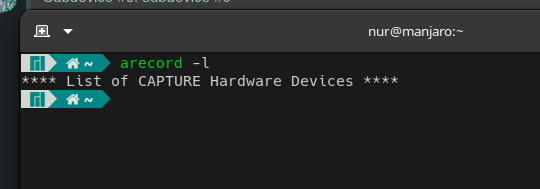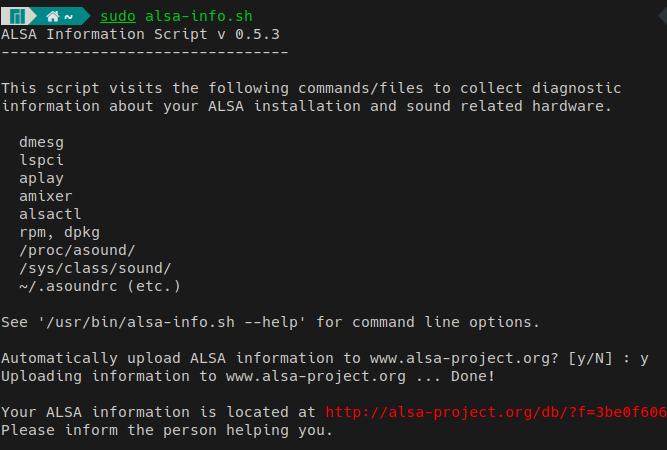inixi -SMAa
System:
Host: manjaro Kernel: 5.15.145-1-MANJARO arch: x86_64 bits: 64 compiler: gcc
v: 13.2.1 clocksource: tsc available: hpet,acpi_pm
parameters: BOOT_IMAGE=/boot/vmlinuz-5.15-x86_64
root=UUID=56d798ec-a782-4fd4-b83b-5b713aacc3d1 ro quiet splash apparmor=1
security=apparmor resume=UUID=ae7db692-da5f-48d8-bbfe-20243ab51ad7
udev.log_priority=3
Desktop: GNOME v: 45.2 tk: GTK v: 3.24.39 wm: gnome-shell dm: 1: GDM
v: 43.0 2: LightDM v: 1.32.0 note: stopped 3: SDDM note: stopped
Distro: Manjaro Linux base: Arch Linux
Machine:
Type: Laptop System: ASUSTeK product: VivoBook 15_ASUS Laptop X507MA_X507MA
v: 1.0 serial: <superuser required>
Mobo: ASUSTeK model: X507MA v: 1.0 serial: <superuser required>
UEFI: American Megatrends v: X507MA.310 date: 10/24/2019
Audio:
Device-1: Intel Celeron/Pentium Silver Processor High Definition Audio
vendor: ASUSTeK driver: snd_hda_intel v: kernel
alternate: snd_soc_skl,snd_sof_pci_intel_apl bus-ID: 00:0e.0
chip-ID: 8086:3198 class-ID: 0403
API: ALSA v: k5.15.145-1-MANJARO status: kernel-api with: aoss
type: oss-emulator tools: alsactl,alsamixer,amixer
Server-1: JACK v: 1.9.22 status: off tools: N/A
Server-2: PipeWire v: 1.0.0 status: active with: 1: pipewire-media-session
status: active 2: pipewire-alsa type: plugin tools: pw-cat,pw-cli
Server-3: PulseAudio v: 16.1 status: off tools: pacat,pactl,pavucontrol
pactl list cards
Card #44
Name: alsa_card.pci-0000_00_0e.0
Driver: alsa
Owner Module: n/a
Properties:
device.enum.api = "udev"
device.api = "alsa"
media.class = "Audio/Device"
api.alsa.path = "hw:0"
api.alsa.card = "0"
api.alsa.card.name = "HDA Intel PCH"
api.alsa.card.longname = "HDA Intel PCH at 0xa1210000 irq 127"
device.plugged.usec = "6639651"
device.bus_path = "pci-0000:00:0e.0"
sysfs.path = "/devices/pci0000:00/0000:00:0e.0/sound/card0"
device.bus = "pci"
device.subsystem = "sound"
device.vendor.id = "0x8086"
device.vendor.name = "Intel Corporation"
device.product.id = "0x3198"
device.product.name = "Celeron/Pentium Silver Processor High Definition Audio"
device.form_factor = "internal"
device.name = "alsa_card.pci-0000_00_0e.0"
device.description = "Built-in Audio"
device.nick = "HDA Intel PCH"
device.icon_name = "audio-card-pci"
api.alsa.use-acp = "true"
api.acp.auto-profile = "false"
api.acp.auto-port = "false"
api.dbus.ReserveDevice1 = "Audio0"
factory.id = "14"
client.id = "32"
object.id = "44"
object.serial = "44"
object.path = "alsa:pcm:0"
alsa.card = "0"
alsa.card_name = "HDA Intel PCH"
alsa.long_card_name = "HDA Intel PCH at 0xa1210000 irq 127"
alsa.driver_name = "snd_hda_intel"
device.string = "0"
Profiles:
off: Off (sinks: 0, sources: 0, priority: 0, available: yes)
output:hdmi-stereo: Digital Stereo (HDMI) Output (sinks: 1, sources: 0, priority: 5900, available: no)
output:hdmi-stereo-extra1: Digital Stereo (HDMI 2) Output (sinks: 1, sources: 0, priority: 5700, available: no)
output:hdmi-stereo-extra2: Digital Stereo (HDMI 3) Output (sinks: 1, sources: 0, priority: 5700, available: no)
output:hdmi-stereo-extra3: Digital Stereo (HDMI 4) Output (sinks: 1, sources: 0, priority: 5700, available: no)
output:hdmi-stereo-extra4: Digital Stereo (HDMI 5) Output (sinks: 1, sources: 0, priority: 5700, available: no)
output:hdmi-surround: Digital Surround 5.1 (HDMI) Output (sinks: 1, sources: 0, priority: 800, available: no)
output:hdmi-surround71: Digital Surround 7.1 (HDMI) Output (sinks: 1, sources: 0, priority: 800, available: no)
output:hdmi-surround-extra1: Digital Surround 5.1 (HDMI 2) Output (sinks: 1, sources: 0, priority: 600, available: no)
output:hdmi-surround71-extra1: Digital Surround 7.1 (HDMI 2) Output (sinks: 1, sources: 0, priority: 600, available: no)
output:hdmi-surround-extra2: Digital Surround 5.1 (HDMI 3) Output (sinks: 1, sources: 0, priority: 600, available: no)
output:hdmi-surround71-extra2: Digital Surround 7.1 (HDMI 3) Output (sinks: 1, sources: 0, priority: 600, available: no)
output:hdmi-surround-extra3: Digital Surround 5.1 (HDMI 4) Output (sinks: 1, sources: 0, priority: 600, available: no)
output:hdmi-surround71-extra3: Digital Surround 7.1 (HDMI 4) Output (sinks: 1, sources: 0, priority: 600, available: no)
output:hdmi-surround-extra4: Digital Surround 5.1 (HDMI 5) Output (sinks: 1, sources: 0, priority: 600, available: no)
output:hdmi-surround71-extra4: Digital Surround 7.1 (HDMI 5) Output (sinks: 1, sources: 0, priority: 600, available: no)
pro-audio: Pro Audio (sinks: 5, sources: 0, priority: 1, available: yes)
Active Profile: pro-audio
Ports:
hdmi-output-0: HDMI / DisplayPort (type: HDMI, priority: 5900, latency offset: 0 usec, availability group: Legacy 1, not available)
Properties:
port.type = "hdmi"
port.availability-group = "Legacy 1"
device.icon_name = "video-display"
card.profile.port = "0"
Part of profile(s): output:hdmi-stereo, output:hdmi-surround, output:hdmi-surround71
hdmi-output-1: HDMI / DisplayPort 2 (type: HDMI, priority: 5800, latency offset: 0 usec, availability group: Legacy 2, not available)
Properties:
port.type = "hdmi"
port.availability-group = "Legacy 2"
device.icon_name = "video-display"
card.profile.port = "1"
Part of profile(s): output:hdmi-stereo-extra1, output:hdmi-surround-extra1, output:hdmi-surround71-extra1
hdmi-output-2: HDMI / DisplayPort 3 (type: HDMI, priority: 5700, latency offset: 0 usec, availability group: Legacy 3, not available)
Properties:
port.type = "hdmi"
port.availability-group = "Legacy 3"
device.icon_name = "video-display"
card.profile.port = "2"
Part of profile(s): output:hdmi-stereo-extra2, output:hdmi-surround-extra2, output:hdmi-surround71-extra2
hdmi-output-3: HDMI / DisplayPort 4 (type: HDMI, priority: 5600, latency offset: 0 usec, availability group: Legacy 4, not available)
Properties:
port.type = "hdmi"
port.availability-group = "Legacy 4"
device.icon_name = "video-display"
card.profile.port = "3"
Part of profile(s): output:hdmi-stereo-extra3, output:hdmi-surround-extra3, output:hdmi-surround71-extra3
hdmi-output-4: HDMI / DisplayPort 5 (type: HDMI, priority: 5500, latency offset: 0 usec, availability group: Legacy 5, not available)
Properties:
port.type = "hdmi"
port.availability-group = "Legacy 5"
device.icon_name = "video-display"
card.profile.port = "4"
Part of profile(s): output:hdmi-stereo-extra4, output:hdmi-surround-extra4, output:hdmi-surround71-extra4

